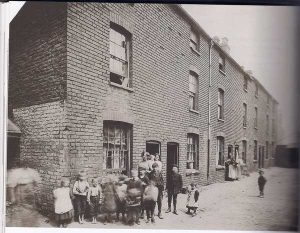By Adrian Brookes.
I have a toddler’s memory of my dad’s childhood home and the horror it inspired in me. Len Brookes grew up in a ‘yard’ in Balsall Heath, an oft-maligned inner-city suburb of Birmingham. Built in Napoleonic-war days, the typical yard consisted of a dozen redbrick houses surrounding a small courtyard. Dad’s house, like all the others, had three storeys of one room each, to which a tunnel of a staircase, rising from a dank cellar, gave access. It was cramped and dingy and smelled coldly of its age.
Originally a yard had a single standpipe for water and a communal kitchen, but these must have been updated by Dad’s birth-year of 1922, even if shared wash houses still sufficed for laundry and ablutions. In one corner of the yard, there were half a dozen cubicles with toilet pails.
As a child my dad knew no different: yard life was normal. The horror I felt stemmed from such privations being far from normal for me—and the reason was my dad’s aspiration.
I should quickly say, his aspiration was a very different creature from the one of today’s political right, of gratuitous consumption. Nor, despite the deprivations of yard life, had social justice been a motivator. My dad’s aspiration was a creature of the deep—born from a working-class conservatism not of politics but of character. This entailed a readiness to content himself with the status quo and, working patiently within its constraints, turn it to his advantage—thereby ‘making good’.
Dad’s schooling unearthed a gift for the English language, landing him, at fourteen, a printing apprenticeship. For a yard kid, this was a gleaming prize, yet it wasn’t a fluke. His unassuming manner masked a considerable ability, which would later be noted by the firm he worked for as well as his air-force commanding officer. A tall-poppy backstreet kid? Maybe, but subject to self-imposed limits.
Three years into Dad’s apprenticeship came World War Two and his conscription into the RAF. Trained as an aircrew wireless operator, he served with Coastal Command in India and Ceylon and was promoted to warrant officer. After the war, in his Service and Release Book, his squadron leader wrote of him, ‘A senior NCO of exceptionally good character. Efficient and most reliable and has shown keenness with his work on this squadron. He has the aptitude of learning quickly.’
And yet quite likely no-one else ever saw these comments in his lifetime. Turning down the chance of a commission, he returned to his pre-war job. Thirty-four years on, after his funeral, my mother showed me the squadron leader’s observations and said, ‘Look what I found. I never knew about this.’
The 1950s brought rising prosperity and greater social mobility. The unions were central to this, and from time to time the NGA would approach my dad and his workmates, only to be politely rebuffed. It was a contented workplace with good relations all round—too good to risk another party’s involvement.
Around this time, Dad turned down a move to Manchester to manage the firm’s printery there. I’ve no doubt he had the ability, but as in the RAF, rising above a certain level was something he couldn’t, in all integrity, resolve.
By the 1960s—it did take that long—the council had razed the yards in favour of more presentable slums, not least the high rises that mushroomed around the city; and it was in these that I did most of my apprenticeship as a painter and decorator. Being my father’s son, I took his attitudes to work with me. I inherited his conservatism as a ready-made mantle without any conscious weaving of it, or indeed any instructions—and therefore little ability to explain it to either myself or anyone else.
But my apprenticeship brought a skeleton out of the closet: my dad’s dad had been a house painter. Harry Brookes wasn’t in my nan’s life for long; he was gone years before I was born and was hardly ever mentioned. I never saw a photo of him and don’t know what became of him. All I know is his name and his trade, which was now mine—with some substantial differences.
Whereas I was guaranteed a forty-hour week with commensurate pay, including sick leave and three weeks’ holiday, Harry would have worked in the trade around the same time as Robert Tressell, author of an Edwardian-era classic of working-class literature, The Ragged Trousered Philanthropists. It was a semi-autobiographical novel, since Tressell—real name Robert Noonan—was a house painter and must have seen, if not suffered, the same degradations as the characters in his book.
In the shabbier parts of Tressell’s fictional Mugsborough, I can see the Balsall Heath of my dad’s childhood. The working class inhabited the ramshackle back streets, with cheap furniture on the never-never, subsisting on meagre staples of bread, margarine and tea. Starvation, Tressell repeatedly stresses, was an all-too-present prospect, and the life’s aspiration of many was no more than to avoid it. Work and income were ever tenuous, and winter would see the great ‘slaughter’, as Tressell terms it, of workers being laid off. Then families would shiver through days without food, pawning clothes and other possessions simply to eat, and accruing debts for rent and bare necessities which would eventually be demanded and often found unpayable.
Was this Harry’s life? If so, he’d also have been aware of the wealth around him, the privilege of the few. Yet far from calling for revolution, Tressell’s workers assured each other it wasn’t for ‘the likes of us’ to share in life’s luxuries. On the contrary, it was the rich who provided them with the work that allowed them to subsist. So whereas Tressell blamed ‘the system’ for the repression of the workers, he put the blame for perpetuating the system not on the masters who ruled it but squarely on the workers who failed to oppose it—or even to see why they should. The labour movement, or socialism, as Tressell identifies it, was despised not only by the establishment but also by workers themselves, who saw it as a threat to the class that threw them the crumbs they lived on.
Tressel was quite a revelation. Was it Harry, seemingly from a life of destitution, who passed down the conservative mindset to young Len, who duly passed it on to me?
In my mid-twenties I left England for Australia, where I gave up trades work for study. Completing first-year history, I found I could use it as a prerequisite for politics, so I glanced at the prospectus. Intriguing! It was quite a discovery, and I enrolled. For a while I read it dispassionately, sifting its theories without owning any particular side. It was in my later years at uni when politics got personal. Of course, I now had to chew things over and taste the ingredients rather than swallow them whole, as I’d done before. Then I caught up with then-current prime minister Malcolm Fraser’s manipulations in the sacking of Gough Whitlam. This, I thought, was bad enough, but it was Fraser’s famous quote, or rather slight misquote of Bernard Shaw, that particularly riled me: ‘Life wasn’t meant to be easy.’ I heard it, coming from him, as a class-laden retort, a scornful throwaway from the smug suit to the sweat-stained overalls, and I saw where my identity was rooted.
I wrote my third- and fourth-year essays with a new intensity. At first I had to block out the echoes of my dad’s conservatism; then I remembered that shortly before he and Mum joined me in Australia, his firm had been ripped out of its cosy lair in a predatory takeover, and the workers had all joined the union after all. My awakening didn’t seem so radical then.
Ideally, this is where I should point to patterns of change and continuity, but characters in memoirs won’t oblige like they do in novels. Harry is a fleeting and static enigma—glimpsed in a flicker of half-light, then gone. Tressell explains probability, not certainty.
As for my dad and me, could the boy sent to empty the yard’s toilet pails have dreamt he’d one day emigrate to a detached house in Melbourne’s leafy Camberwell? And could the lad who turned up in his overalls at the Birmingham builders’ yard have thought he’d one day teach in an Australian university?
No way to both. But life doesn’t turn out that way without some current propelling it. That creature of the deep was ushering us along, even when, like a painter, we were only concerned with the surface.
ABOUT THE AUTHOR
Adrian Brookes grew up in the English West Midlands but has lived most of his life in Australia. A former journalist and English teacher, he writes short fiction and songs.



Sharon Welgus
Thoroughly enjoyed this, Adrian. Well done.
Jo Curtain
Adrian, A Creature of the Deep is a fascinating read and beautifully written. Jo 🙂
Andrew McMillan
Really interesting.
Guenter
What an exemplary piece of writing! Adrian, I doffs me ‘at to you. Your memoir had me hooked from the opening line right to its memorable metaphorical conclusion. Your socio-political contextualisation added a robustness of depth and a broader canvas to make this fine work even more memorable. Thanks.